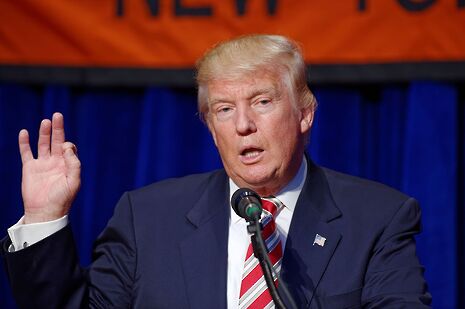Stop labelling Trump mentally ill
Calling Trump ill only stigmatises mental illness

It doesn’t take much of a scroll through social media to come across articles claiming that Donald Trump has narcissistic personality disorder. Despite the ‘Goldwater rule’, which prohibits psychiatrists from given diagnoses about people they have not personally evaluated, many mental health professionals have come forward with armchair diagnoses of Trump. The American Psychological Association warned last year that breaking the rule in trying to analyse presidential candidates during the election was “irresponsible, potentially stigmatising, and definitely unethical”. Since Trump’s success in the election, the tide has changed. Most recently, the psychiatrist John Gartner has called out Trump as “dangerously mentally ill and temperamentally incapable of being president”. Apparently, a mental illness is what renders Trump unfit to be president, and not simply the host of disgusting, hateful statements that he spiels on a daily basis.
The diagnostic guessing game of whether Trump has a mental illness might seem harmless, or even a productive input into the discussion of why Trump is unfit to be President, but this misplaced attention is deeply harmful. By focusing on an alleged personality disorder, it detracts attention away from the real problem – his actions. Trump is not an abhorrent person because of a supposed mental illness. He is an abhorrent person because he is a racist, sexist, xenophobic, islamophobic bigot. By pointing the blame towards mental illness, rather than his political policies, we might as well be saying that his policies are acceptable in their own right, and only become unacceptable if they are promoted by someone with mental illness. Apparently, there’s not enough reason to consider him to be an illegitimate President. Trump is mentally ill? Well, now we have a reason that he’s not fit to be President!
Perhaps Trump does have a mental illness. Perhaps he does have narcissistic personality disorder. But, so what? It might be relevant to his therapist, but it’s irrelevant to whether or not his actions are acceptable. Trump would still be a bigot without the alleged personality disorder. We should be focusing on what he does, not why he does it. Yet, somehow, it’s seen as a more cutting insult to call Donald Trump mentally ill than it is to call him a bigot, which says an awful lot more about society’s views of mental illness than it does about his decency.
“Somehow, it’s seen as a more cutting insult to call Donald Trump mentally ill than it is to call him a bigot”
It’s doubtful whether Trump even has the disorder, making the discussion even more problematic. Recently, Allen Frances, the psychiatrist who wrote the diagnostic criteria for narcissistic personality disorder, urged colleagues not to mistake Trump’s “grandiosity, self-absorption and lack of empathy” for a personality disorder. Frances urges people to recognise that being a narcissistic bigot and being mentally ill are two different kettles of fish, but armchair diagnosis is lumping the two together. Frances is quick to point out the difference between being ‘mad’ and being ‘bad’, and argues that Trump falls into the latter category, because he causes distress without experiencing it himself. We need to place the focus on his political actions, not the psychological reasons behind it.
Trying to diagnose Trump is not only damaging because it detracts attention away from his actions – it is damaging because it draws the blame towards those with mental illness. Society has a shameful habit of using psychiatric diagnoses as insults. Around three to five per cent of the population have a diagnosis of personality disorder, but we only hear about people like Trump. When the media keeps labelling ‘bad people’ as mentally ill, who don’t even have a diagnosis of a mental illness, it promotes stigma. We never hear about the silent majority of people with personality disorders who go about their lives without causing harm to anyone.
Because personality disorders are so stigmatised, the force of the stigma gives the diagnosis the status of an insult – something to delegitimise people we don’t like. People hear ‘narcissistic personality disorder’ and equate it with ‘bad person’, so ‘bad people’ like Trump are branded with the disorder on the basis that people disagree with their behaviour. The media continually uses mental illnesses as insults, whether to label a politician they disagree with or to create a character in a horror film, and each time they do so it harms people who live with mental illness
Trump should be called out for his behaviour in and of itself – it doesn’t need the label of mental illness to make it wrong. His actions and policies should be called out, without needing to stigmatise mental health problems. Throwing diagnoses around like playground name-calling does very little to delegitimise Trump, but a lot to stigmatise the
mentally ill
 News / Report suggests Cambridge the hardest place to get a first in the country23 January 2026
News / Report suggests Cambridge the hardest place to get a first in the country23 January 2026 News / Reform candidate retracts claim of being Cambridge alum 26 January 2026
News / Reform candidate retracts claim of being Cambridge alum 26 January 2026 News / Cambridge ranks in the top ten for every subject area in 202623 January 2026
News / Cambridge ranks in the top ten for every subject area in 202623 January 2026 Comment / Cambridge has already become complacent on class23 January 2026
Comment / Cambridge has already become complacent on class23 January 2026 News / Palestine activists project slogans onto John’s24 January 2026
News / Palestine activists project slogans onto John’s24 January 2026








